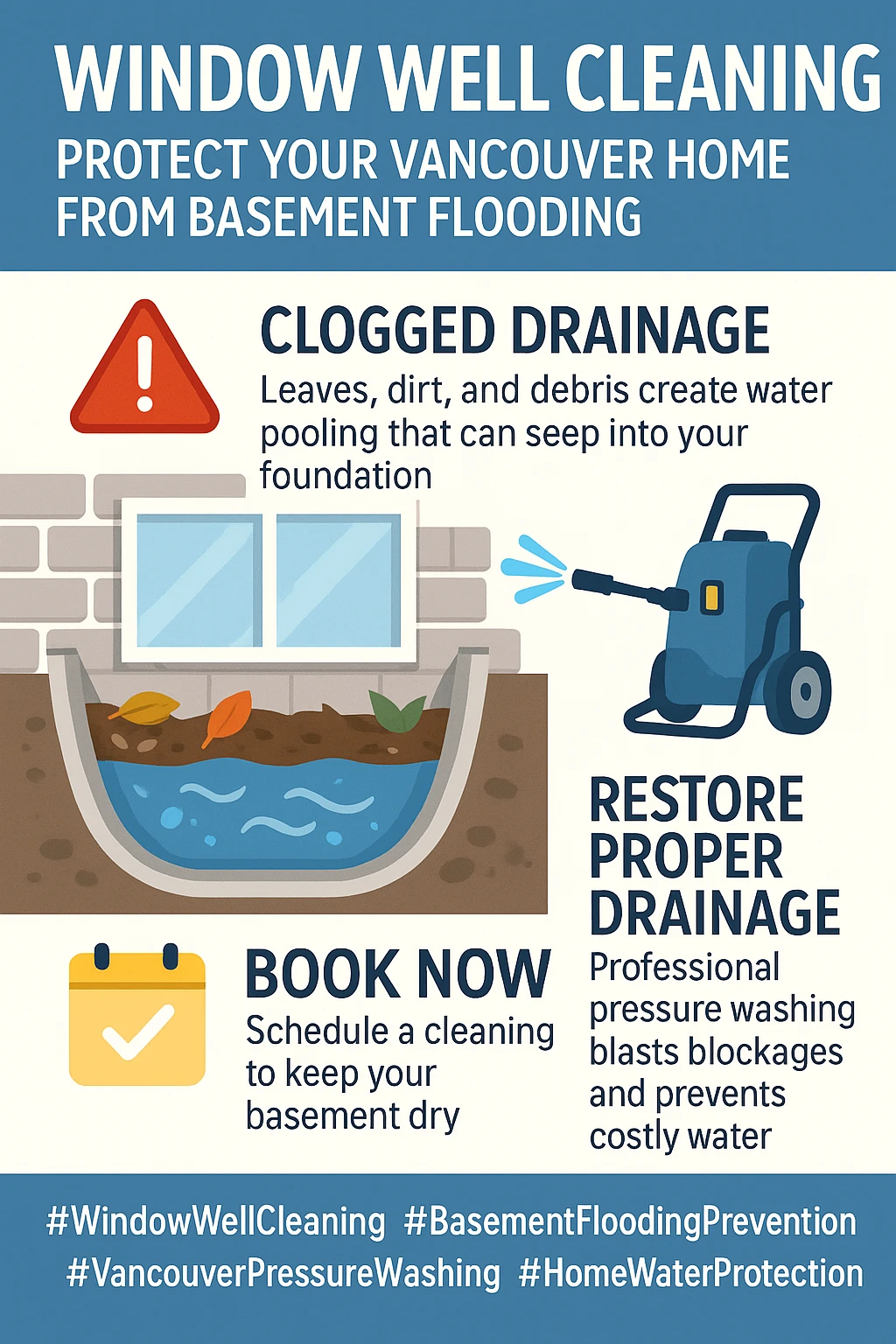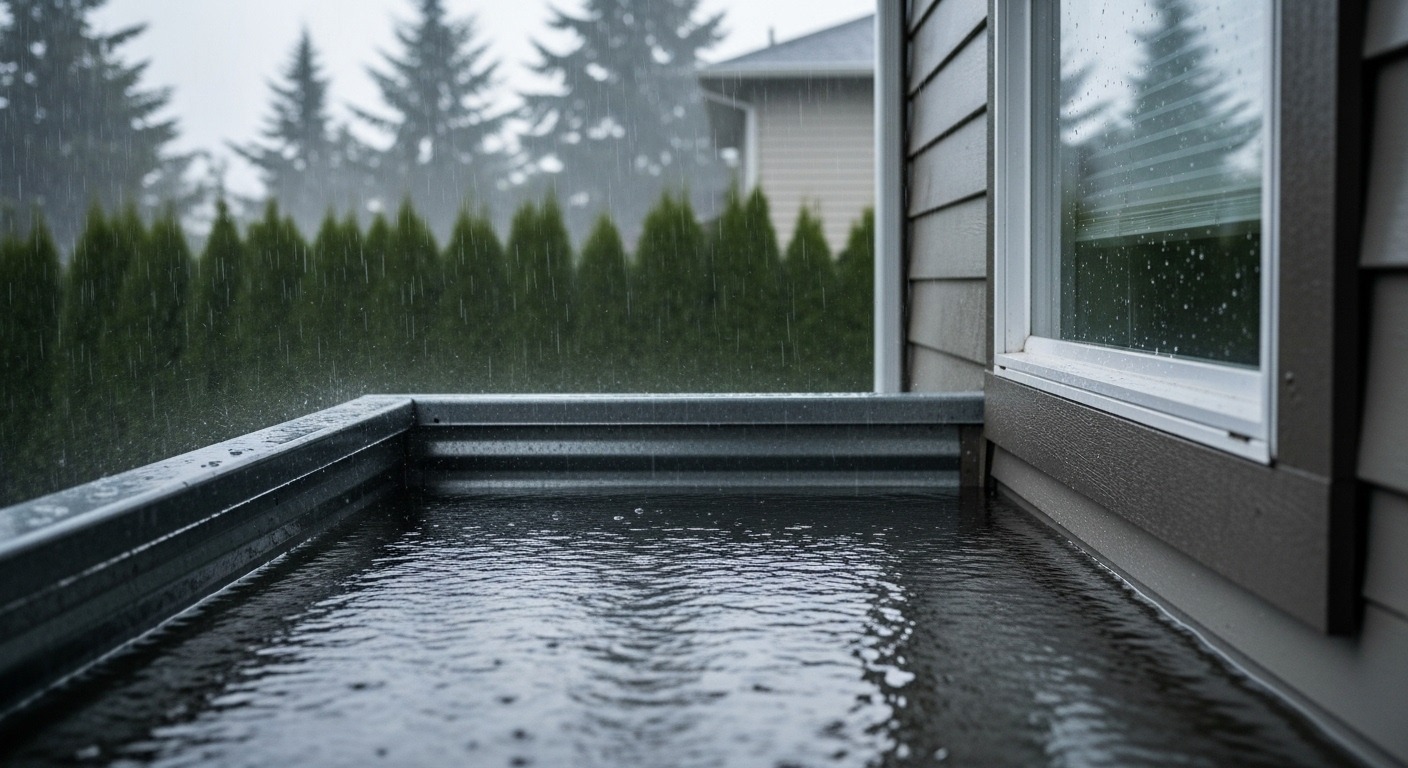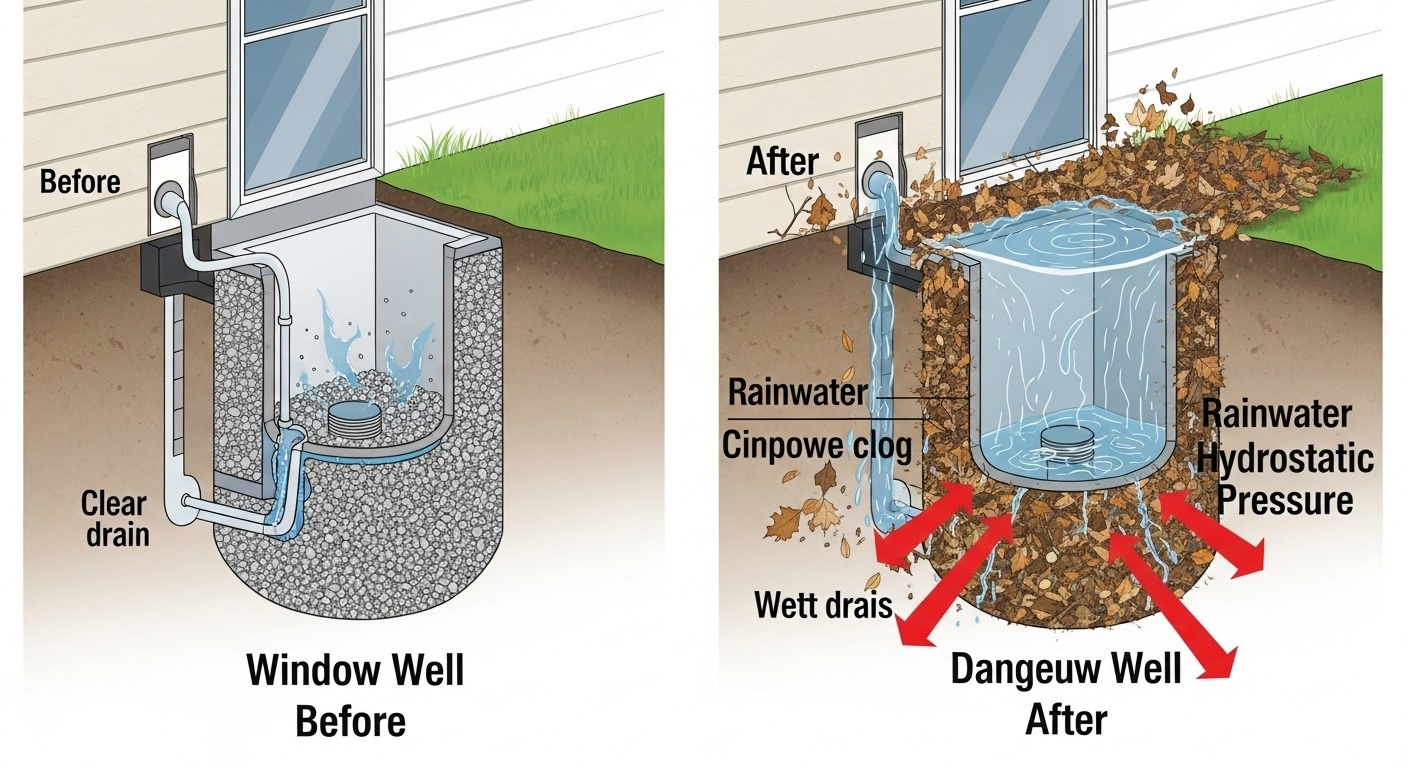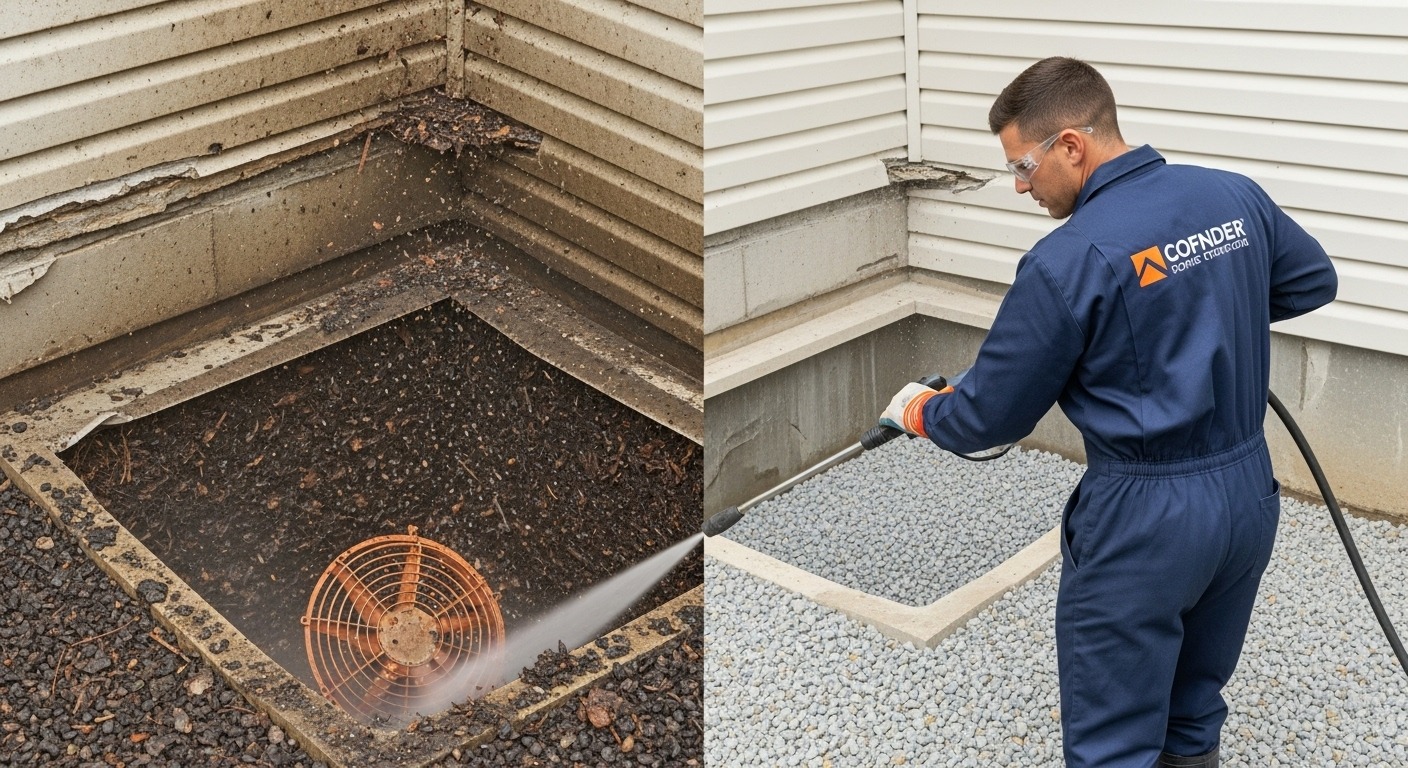Why Your Vancouver Home’s Window Wells Are Creating Basement Flooding Risks (And How Pressure Washing Prevents Water Damage)
Tired of dealing with soggy basements and wondering why that expensive window well installation isn’t keeping water out like it should? You’re not alone – Vancouver’s unique climate creates the perfect storm for window well drainage failures, turning these protective features into flooding hazards that can cost homeowners an average of $43,000 in damage repairs.
If you’ve been scratching your head wondering why your basement keeps getting damp despite having window wells, you’re dealing with one of Vancouver’s most overlooked home maintenance challenges. Those seemingly innocent concrete or metal barriers around your basement windows are supposed to protect your home from water infiltration, but when they’re not properly maintained, they become collection pools that direct water straight into your foundation.
The reality is that Vancouver’s marine climate creates conditions that most standard window well installations simply aren’t designed to handle. With over 1,100mm of rainfall annually and extended wet seasons that last from October through March, your window wells are working overtime to manage water loads that would challenge even the most robust drainage systems. When you add in the organic debris from our lush urban canopy and the unique challenges of marine clay soil, you’ve got a recipe for basement flooding disasters.
What’s particularly frustrating for Vancouver homeowners is that these problems are entirely preventable with proper maintenance and cleaning techniques. Professional pressure washing services have emerged as one of the most effective solutions for window well maintenance, using specialized equipment and techniques to remove the compacted debris and organic matter that clogs drainage systems and creates flooding risks.
Key Outtakes:
- Vancouver receives 1,189mm of annual rainfall over 169 rainy days, making proper window well drainage critical for basement protection, with some areas like North Vancouver seeing double that amount
- Basement flooding costs Canadian homeowners an average of $43,000 per incident, with window well failures being a leading preventable cause of water damage
- Regular pressure washing removes compacted organic debris that blocks drainage systems, preventing water accumulation and dangerous hydrostatic pressure buildup against foundations
- Professional window well maintenance should occur twice yearly in Vancouver’s climate to address seasonal debris accumulation and prepare for the October-March wet season
- Proper gravel installation and drain cleaning can eliminate up to 80% of window well flooding incidents before they occur, making maintenance a cost-effective insurance policy

Vancouver’s Climate Creates Perfect Storm for Window Well Problems
Vancouver’s marine climate presents unique challenges that transform window wells from protective features into potential flooding hazards. Understanding these climate-specific factors is crucial for any homeowner looking to prevent basement water damage through effective window well maintenance and cleaning strategies.

The extended wet season from October through March creates prolonged periods where soil around your foundation remains saturated. Unlike inland climates that experience brief intense storms followed by dry periods, Vancouver’s sustained rainfall creates cumulative water loading that continuously tests your window well drainage capacity. This marine climate pattern means your drainage systems never get a chance to fully dry out and reset between weather events.
Temperature fluctuations add another layer of complexity to window well maintenance in Vancouver. While we don’t experience extreme freezing like prairie provinces, our winter temperatures can still drop to -12°C, creating freeze-thaw cycles that cause expansion and contraction of window well materials. These cycles lead to seal failures, structural cracks, and compromised waterproofing integrity that compound over time.
The orographic effect of our coastal mountains creates dramatic rainfall variations across the metro area. While downtown Vancouver receives about 1,119mm annually, areas like North Vancouver can see over 2,400mm of precipitation. This creates pressure differentials where some neighborhoods experience significantly higher water loading against foundations, making standardized window well installations inadequate for local conditions.
Vancouver’s urban canopy presents another challenge rarely discussed in general window well maintenance guides. Our lush deciduous trees create massive amounts of organic debris during fall months, while the wet climate provides ideal conditions for rapid decomposition. This decomposing organic matter doesn’t just clog drains – it creates acidic conditions that can damage window well materials and accelerate deterioration of drainage systems.
How Window Wells Transform from Protection to Flooding Hazard
Understanding how window wells transition from protective barriers to flooding risks requires examining the specific failure modes that occur in Vancouver’s unique environment. Most homeowners don’t realize that their window wells are gradually becoming liability rather than assets until water damage has already occurred.

The most common transformation occurs through debris accumulation that blocks drainage pathways. Vancouver’s wet climate and abundant vegetation create ideal conditions for leaves, twigs, and organic matter to collect in window wells. Unlike drier climates where this debris might blow away or decompose slowly, our consistent moisture creates a perfect environment for organic matter to compact and form impermeable barriers that prevent proper drainage.
Foundation settling presents another critical failure mode specific to Vancouver’s marine clay soils. These soils are particularly prone to differential settling, which can alter the grading around window wells over time. What starts as proper drainage away from the foundation can gradually reverse, creating a bowl effect that directs surface water toward basement walls rather than away from them. This settling process accelerates during wet periods when clay soils become saturated and lose structural integrity.
Window well cover failures during Vancouver’s storm events represent a third major transformation pathway. Many existing installations lack proper integration with our specific wind and rain patterns. Standard covers designed for other climates often fail to account for the driving rain that can persist for days during Pacific storm systems, leading to water infiltration that overwhelms drainage capacity.
The hydrostatic pressure buildup that occurs when window wells fill with water creates forces that can exceed the structural capacity of basement windows and foundation walls. In Vancouver’s saturated soil conditions, this pressure can build quickly during heavy rainfall events, turning a minor drainage problem into a catastrophic flooding situation within hours.
Professional assessment of window well condition reveals that most failures occur gradually through a combination of these factors rather than sudden catastrophic events. Regular inspection and maintenance can identify these transformation processes before they reach critical failure points, making prevention far more cost-effective than emergency repairs.
The Science Behind Pressure Washing for Window Well Maintenance
Professional pressure washing represents a scientifically sound approach to window well maintenance that addresses the specific challenges created by Vancouver’s climate and soil conditions. Understanding the technical aspects of pressure washing for window well cleaning helps homeowners make informed decisions about maintenance strategies.

High-pressure water removal of compacted organic debris works by breaking apart the molecular bonds that hold decomposed organic matter together. Vancouver’s wet climate creates conditions where leaves and organic debris don’t simply decompose – they form dense, impermeable mats that manual removal cannot effectively address. Professional pressure washing equipment generates controlled water pressure that can penetrate these compacted layers and restore proper drainage flow paths without damaging underlying gravel or drainage infrastructure.
The key to effective pressure washing for window well maintenance lies in understanding the different pressure requirements for various cleaning tasks. While driveway cleaning might require 2000+ PSI, window well cleaning typically uses specialized low-pressure techniques ranging from 500-800 PSI. This controlled pressure is sufficient to remove organic debris and mineral deposits while preserving the integrity of drainage gravel and avoiding damage to foundation waterproofing membranes.
Professional pressure washing techniques employ specific nozzle angles and spray patterns designed to clean debris without displacing essential gravel drainage layers. The gravel at the bottom of window wells must remain loose and properly graded to allow effective drainage to perimeter drains. Improper pressure washing techniques can compact this gravel or displace it entirely, actually worsening drainage problems rather than solving them.
Water recovery and containment during pressure washing operations is particularly important in Vancouver’s urban environment. Professional services use specialized equipment to capture and properly dispose of contaminated wash water, preventing soil contamination and ensuring compliance with municipal drainage regulations. This is especially critical when cleaning window wells that may contain accumulated pollutants from urban runoff.
The timing of pressure washing operations aligns with Vancouver’s seasonal patterns to maximize effectiveness. Spring cleaning removes accumulated winter debris and prepares drainage systems for the rainy season, while fall maintenance clears organic matter before winter weather compounds blockage problems. This seasonal approach ensures that window well drainage systems operate at peak capacity when they’re needed most.
Professional vs. DIY Window Well Maintenance in Vancouver
The decision between professional window well maintenance and DIY approaches involves understanding the specific technical requirements and safety considerations unique to Vancouver’s urban environment and climate conditions. While some maintenance tasks can be handled by homeowners, others require specialized equipment and expertise to avoid costly mistakes.
Professional hydrovac technology represents one of the most significant advantages of using qualified service providers for window well maintenance. This specialized excavation metho

